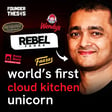
The Taboo-Busting D2C Brand | Deep Bajaj @ Sirona Hygiene
"Energy is like money—it's a finite resource. When it's gone, we die. When it's there, we're bubbling with energy. So spend it judiciously."
Deep Bajaj shares a powerful perspective on personal energy management, a critical factor often overlooked in the hustle of entrepreneurship. Conserving your energy and avoiding "energy vampires" is just as important as managing your finances.
Deep Bajaj is the Founder & CEO of Sirona Hygiene, a company tackling the often-taboo subject of feminine hygiene in India. From launching India's first stand-and-pee device (PeeBuddy) to building a profitable company with a projected revenue of 40+ crores in FY 21-22, Deep's journey is one of relentless innovation and addressing unmet needs. Sirona has impacted millions of women, with over a million using their menstrual cups.
Key Insights from the Conversation:
- Problem-First Approach: Deep's success stems from identifying real-world problems and building practical solutions, even if they're initially unconventional.
- Thousand Day Rule: Deep emphasizes committing fully to a business for at least 1,000 days to see its true potential.
- IP Creation: Building a brand and creating intellectual property is a key driver for long-term success, more so than just chasing revenue.
- Serendipity and resilience: Recognizing that success is not a linear path, many key moments came unexpectedly.
- Staying positive and resourceful: With limited funds, being profitable was the only option.
Chapters:
- 00:00:00 - Introduction: Deep Bajaj's Early Life & Influences
- 00:07:14 - First Ventures: Call Centers, Insurance & The 1000-Day Rule
- 00:15:10 - Australia, Events Business & The Importance of IP
- 00:23:43 - The Road Trip Revelation: PeeBuddy's Origin Story
- 00:32:43 - Building Sirona: Co-founder, Branding & Early Product Strategy
- 00:41:17 - Funding, Rapid Growth & Refining Distribution
- 00:49:52 - Product Deep Dive: Menstrual Cups & Solving Real Problems
- 00:59:50 - Scaling Challenges & Building Awareness for Taboo Topics
- 01:06:35 - The Good Glamm Partnership: Rationale & Strategic Vision
- 01:12:48 - Final Thoughts: Energy, Action & Entrepreneurial Resilience
Hashtags:
#SironaHygiene #DeepBajaj #PeeBuddy #MenstrualHygiene #FemaleHygiene #IndianStartups #Entrepreneurship #FounderJourney #D2C #FMCG #Innovation #TabooTopics #SocialImpact #StartupIndia #WomensHealth #PeriodPoverty #BusinessStrategy #Funding #VentureCapital#GoodGlammGroup #EnergyManagement #ThousandDayRule #ProductDevelopment #BrandBuilding #IndianEntrepreneurs



















